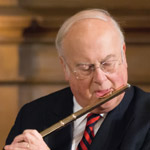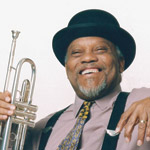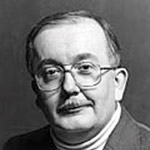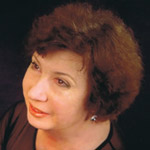Transition:
The retirement of four conservatory faculty members invites a look at their lives and legacies
Amid the fanfare of commencement weekend 2011, in which graduating seniors celebrated the closure of a significant chapter of their lives and the opening of another, a different transition was taking place: the retirement of four Conservatory of Music faculty members. We take this opportunity to reflect on their remarkable teaching and performing careers, both at Oberlin and at large, and to the many ways they’ve influenced generations of students and helped shape the personality of the institution.

Michel Debost
(Photo by Chris Leck)
Professor of Flute Michel Debost served Oberlin for 22 years, and his retirement will be talked about in flute circles around the world. His innumerable accomplishments and accolades speak for themselves: he has won major competitions, served as principal flutist in the Opéra national de Paris and the Orchestre de Paris, and served as professor at the Conservatoire de Paris before his appointment to Oberlin in 1989. In 2001, the National Flute Association honored him with its lifetime achievement award for his significant and lasting contributions to the flute world.
Through his performances, teaching, and writing, Debost has enriched the lives of generations of young flutists, many of whom have gone on to be successful performers and teachers themselves. A monthly columnist and consulting editor for Flute Talk magazine, he also authored the book Une Simple Flute (1996), which met with great success and has been translated into English, Spanish, and German. His album and CD recordings have garnered many awards, including a Grammy nomination for his Telemann duets with James Galway. Until recently, Debost continued to perform recital tours annually.
"The culture of the school, with its fabulous libraries and intellectual rigor, encourages a sincere respect for knowledge and books."
Debost studied at the Conservatoire de Paris with Jan Merry, Gaston Crunelle, and Marcel Moyse. Reflecting on the educational systems in France and the U.S., Debost says he sees many differences, although they have tempered over time. Each system, he believes, has its benefits. "Attending the Gymnasium (high school) in postwar France," he says, "there was no music, no art, no social activities; academic excellence was expected. In the States, however, high school is a time to discover yourself and make friends. Ironically, in college, the situation is reversed. American students become very serious, whereas in France, all the barriers were off and you could do whatever you wanted."
Debost’s career soared as he won every major flute competition—Moscow, Prague, Geneva, Munich, and Turin. During his 30-year tenure as principal flute with the Orchestre de Paris, he worked with music directors Charles Munch, Herbert von Karajan, George Solti, and Daniel Barenboim. In 1989, Debost and his American-born wife, Kathleen Chastain (also on the faculty at Oberlin), moved to Oberlin. Although they maintain close ties to family, friends, and politics in France, they have never looked back. As Debost puts it now, "we have been married for 44 years. Kathleen gave me 22 years in France, and now we have been 22 years in the U.S."
Debost and Chastain (who will continue to teach at the conservatory), intend to stay in Oberlin but will make frequent visits to France to see family and friends.
Debost admires Oberlin students: "They are serious, with a sincere respect for knowledge and books." He adds that they have always been that way, and that the culture of the school, with its fabulous libraries and intellectual rigor, encourages such traits. Debost himself loves to read, especially French and American history, and he is passionate about art and the study of art. He plans to continue to pursue these interests in retirement.

Marcus Belgrave
December 2010 saw the retirement of another living legend: jazz trumpeter Marcus Belgrave. Most musicians know him by name, but people all over the world know his clear, soulful trumpet sound through recordings and performances that stretch back over his five-decade-long career. For 40 of those years, he was a celebrated figure in the Detroit music scene.
Belgrave grew up in Chester, Pennsylvania, and was inspired by Louis Armstrong. Taught first by his father, Belgrave quickly found himself working in bands, sitting beside musicians like Clifford Brown, and touring extensively with Ray Charles. In 1963 Belgrave embraced the new sound of Motown and moved to the Motor City to work with the founder of Motown Records, Berry Gordy Jr. Thus began a seven-year recording career there, which is preserved on such classics as My Girl and The Way You Do the Things You Do. He has performed with innumerable artists, many considered the best in the business: Aretha Franklin, Dizzy Gillespie, Tony Bennett, Ella Fitzgerald, B.B. King, Sammy Davis Jr., and many others.
Marcus has performed with innumberable artists, many of whose names are synonymous with the best in the business.
Belgrave has received numerous accolades and awards for his artistic and educational achievements, including the Michigan Governor’s Award, the 2009 Kresge Eminent Artist Award, and the 2009 Jazz Guardian Award for Artistry. In 2008 he was honorably designated Jazz Master Laureate for the city of Detroit.
In addition to his storied career as a jazz performer, Belgrave has also been a dedicated educator. In the 1970s, he founded the Jazz Development Workshop in his adopted town of Detroit, where he worked to develop the musical talents of local youth. He was also a founding faculty member of the Oakland University jazz studies program. He has taught students of every level from elementary school through college, and has served on Oberlin’s faculty since 2001.
Belgrave says he was drawn to the conservatory by the personality and vision of the late Wendell Logan, founder of Oberlin’s jazz studies program. "Wendell attracted and retained so many talented faculty members during our years of lean living in Hales Gymnasium; that is a testament to the power of his vision," Belgrave says. He notes that the program has grown significantly, and that his own studio has reached as many as a dozen jazz trumpeters. Belgrave is thrilled that jazz studies is now connected (literally) to the rest of the faculty through the wonderful new Kohl Building.
Decades of trumpet students have benefited from Belgrave’s wisdom and inspiration, along with a host of other musicians. Among them are pianist Geri Allen, violinist Regina Carter, and saxophonists James Carter, Kenny Garrett, and Charlie Gabriel.
While Belgrave has scaled back his teaching considerably, he continues to perform and looks forward to recording more. He has also made time for one of his secret loves: the cello.

Alan Montgomery
A member of the conservatory community since 1979, Alan Montgomery was the first—and only—assistant music director of Oberlin Opera Theater. And even after 32 years in the position, he says, his approach to vocal coaching, accompanying, and conducting was filled with the same buoyancy and spirit at the end of his career as it was in the early years. Investing in students was a top priority during his tenure, and he has enjoyed sharing in their musical journeys and experiences.
Montgomery earned his bachelor’s, master’s, and doctoral degrees in conducting at Indiana University, where he also served as a teaching assistant for vocal coaching. After several seasons at the Whitewater and Hamburg State operas, he arrived at Oberlin to assume the newly created position of assistant music director. That same year, he began a 14-year tenure as artistic director of the Nettle Creek Players in Indiana, a summer repertory theater that stages new and existing works, including two of Montgomery’s own musicals: Robin Hood! (1985) and A Dog’s Life (1989).
Alan’s approach to vocal coaching, accompanying, conducting, and other duties is still filled with the same buoyancy and spirit as it was during his early years.
Reflecting on the character and culture of Oberlin, Montgomery says that while many things have changed, such as the facade of buildings and structures, he believes the heart of the Oberlin culture and students has remained the same. Students, he says, have always been serious about their studies and about maintaining high standards while still being fun to work with. Today’s students, he says, are career-focused from the start. With the successes that students are experiencing now (Oberlin has had more winners of the Metropolitan Opera auditions than any other music school), he says it’s no surprise that their eyes are on their professional futures.
Montgomery had a song cycle produced at Oberlin, and 15 years ago began arranging pieces—now highly anticipated and well-known—for Oberlin’s annual Bassoon Christmas. He’s also served as organist of the local Methodist church for more than 20 years and as the choir music director. In 2009 he published his first novel, The Further Adventures and Life of Jack Dawkins, also known as The Artful Dodger.
Montgomery plans to remain in Oberlin, maintaining his positions at church and finishing his second novel. And while he won’t miss nighttime rehearsals, he says the people and place motivate him as much as ever. He considers himself a fixture in Oberlin, and will continue to be for many years to come.

Sedmara Rutstein
Professor of Piano Sedmara Zakarian Rutstein represents an important link to a great tradition of performance and pedagogy. Rutstein was trained during the height of Soviet Russia in a legendary Russian conservatory school known for its discipline and strictness. The sincerity and passion associated with the great Russian performers has always been alive in her playing, as well as in her teaching.
Rutstein was discovered at an early age and enrolled in Leningrad’s Special Music School for Gifted Children. Graduating from the Leningrad State Conservatory with a doctoral degree in 1962, she has since performed countless concerts as a concerto soloist, recitalist, and chamber musician across Russia, the United States, Europe, and China. She has 15 solo albums to her credit, including a recording of Bach’s Art of the Fugue on harpsichord. After 11 years teaching at the Leningrad State Conservatory, Rutstein came to the United States, and, in 1976 joined the faculty of the Oberlin Conservatory of Music. After 35 years of teaching, she was one of the conservatory’s most senior faculty members.
The sincerity and passion associated with the great Russian performers has always been alive in Sedmara’s playing, as well as in her teaching.
Asked about the Russian Conservatory tradition, Rutstein has a one-word reply: strict. Every aspect of technique, interpretation, style, and sound was scrutinized at the finest level. In its most gifted students, this results in a musician of uncompromising standards who also possesses great insight in the intentions of the composer; Rutstein is just such a performer. Following one of her many performances, the New York Times declared Rutstein "A radiant success" and added, "She has forceful interpretive ideas and the technique to carry them out."
Rutstein applies the same rigorous standards to her own teaching, and she challenges her students to see beyond the technique and study the style and sound that is unique to each composer and piece. Rutstein notes that not all American students are accustomed to such a high level of discipline from an early age, yet she glows when asked about her students. "Americans are very organized and have an excellent work ethic. By junior or senior year these students are soaring." Have her students changed over the years? "I have changed," is her immediate reply. "I am much more efficient now."
Sedmara Rutstein and her husband of 51 years, Alex, have one daughter and one grandchild. They own a home in Maryland that allows them to stay close to their family, and in a year or so plan to move there. In that house they have a splendid Steinway B purchased from National Public Radio, and Rutstein looks forward to practicing, performing, and recording.
James Kalyn has taught secondary saxophone in the conservatory.
